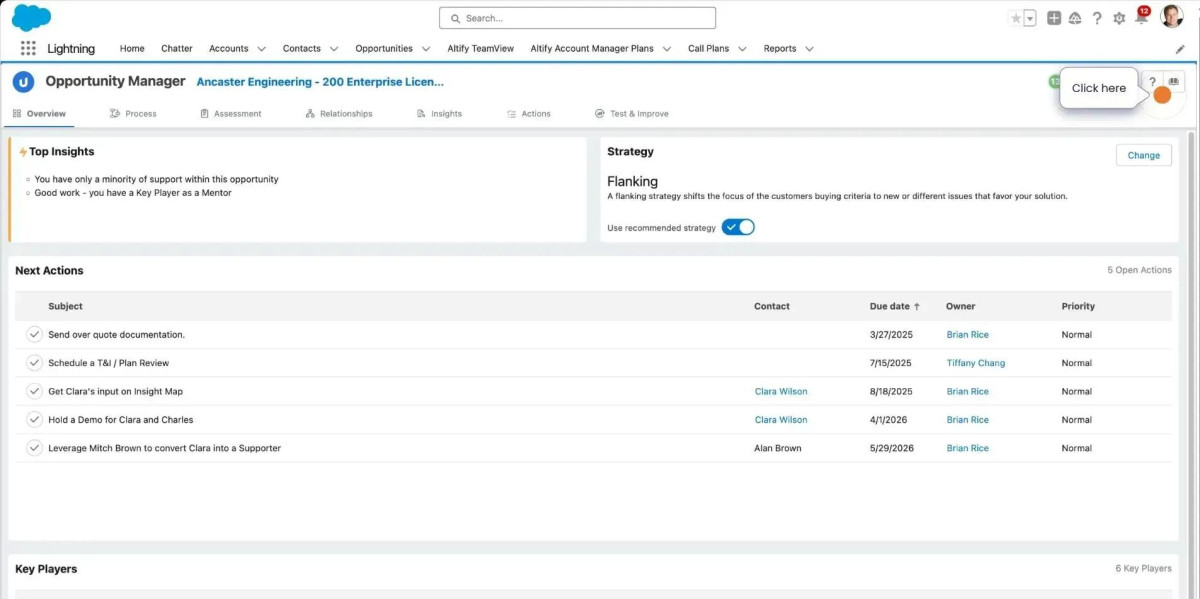Account Planning Software Revolutionizes Revenue Enablement and Opportunity Management, Driving Predictable Growth
Los Angeles, United States - August 23, 2025 / Altify /
Companies leveraging structured account planning software are achieving win rates up to 40 percent higher and significantly more predictable revenue growth, according to new insights into revenue enablement strategies.
In today's competitive landscape, businesses that move beyond spreadsheets and adopt specialized account planning software are transforming their sales and customer success operations. This shift centralizes critical account data, streamlines strategic initiatives, and provides actionable insights, ultimately fueling revenue enablement and accelerating opportunity management. These advancements are key components of effective revenue enablement services.
Forrester Research highlights the impact, noting that structured account planning is crucial for business outcomes. Without a unified platform, sales and customer success teams often struggle with fragmented data, missed upsell signals, and inaccurate forecasting, leading to lost opportunities and hindered collaboration.
Key Benefits and Features of Account Planning Software
Account planning software offers a comprehensive solution by combining structured templates, data aggregation, and collaborative workflows. Core components include:
Account Intelligence: Real-time scoring and health indicators provide a clear view of account status.
Collaborative Planning: Shared maps to visualize buyer relationships and insights, task assignments, and approval workflows ensure team alignment and cohesion.
Forecasting Modules: Pipeline visualization and predictive analytics enhance revenue projections, and reduce deal slippage.
This technology empowers strategic account planning by guiding users through goal definition, opportunity prioritization, and milestone tracking. It embeds proven frameworks like SWOT analysis and stakeholder mapping into interactive templates, allowing for real-time progress monitoring and data-driven tactical adjustments. This is a core aspect of robust opportunity management software.
Account intelligence plays a vital role by ingesting CRM histories, engagement metrics, and external firmographics to assign opportunity scores and flag at-risk accounts. Predictive signals, such as declining product usage, prompt proactive retention campaigns, driving continuous optimization of account strategies, and supporting overall revenue enablement services.
Driving Sales Productivity and Customer Lifetime Value
The implementation of account planning software leads to substantial improvements in operational efficiency and revenue. Key advantages include:
Enhanced Sales Productivity and Forecasting Accuracy: Automation of data consolidation and AI-driven analytics reduces manual research, allowing sales teams to focus on engagement. Forecasts become more reliable through real-time pipeline updates.
Increased Customer Lifetime Value and Retention: The software surfaces upsell and cross-sell triggers, can track renewal timelines, and standardizes health-check cadences. Documented account milestones drive proactive outreach, leading to increased renewal rates, higher average deal sizes, and reduced churn.
Facilitated Cross-Team Collaboration: By hosting shared account planning processes, centralized task lists, and integrated communication threads, account planning software breaks down silos. Teams can create joint account playbooks, conduct structured deal and account reviews, track action items in real-time, and exchange context-rich comments, promoting cross-functional alignment towards revenue growth strategies.
Seamless CRM Integration and Industry Applications
Being natively embedded with CRM systems like Salesforce is crucial for maintaining synchronized account data and creating a single source of truth and best practices. Salesforce native account planning software eliminates data silos, enriches lead and contact profiles with account health indicators, and automates workflows triggered by CRM events, enhancing the capabilities of opportunity management software.
Account planning software finds diverse applications across industries. Sales teams leverage it for strategic account growth by identifying expansion opportunities and coordinating multi-touch campaigns. Customer success managers use it to reduce churn and increase upselling through prebuilt health-check templates and risk-scoring models. In SaaS, platforms track usage metrics for renewals and upsells, while in manufacturing, account plans incorporate project timelines and regulatory milestones.
Choosing the Right Solution
Selecting the best account planning software involves evaluating critical factors such as integration capabilities, scalability, user interface, customization, and security. Pricing models and vendor differentiation also play significant roles in the decision-making process.
Conclusion
Account planning software transforms fragmented processes into a unified revenue enablement engine. By leveraging intelligent dashboards, automated workflows, and seamless CRM integration, organizations gain predictable forecasting, improved collaboration, and enhanced customer lifetime value. Evaluating vendors based on integration, scalability, and ease of use ensures the chosen solution aligns with strategic objectives and drives consistent, data-driven growth.
About Altify
Altify is a leading provider of innovative account planning solutions designed to empower sales, marketing, and customer success teams to achieve predictable revenue growth and enhance

Contact Information:
Altify
10100 Santa Monica Blvd
Los Angeles, California 90067
United States
Andrea Alvarez
10000000000
https://altify.com

